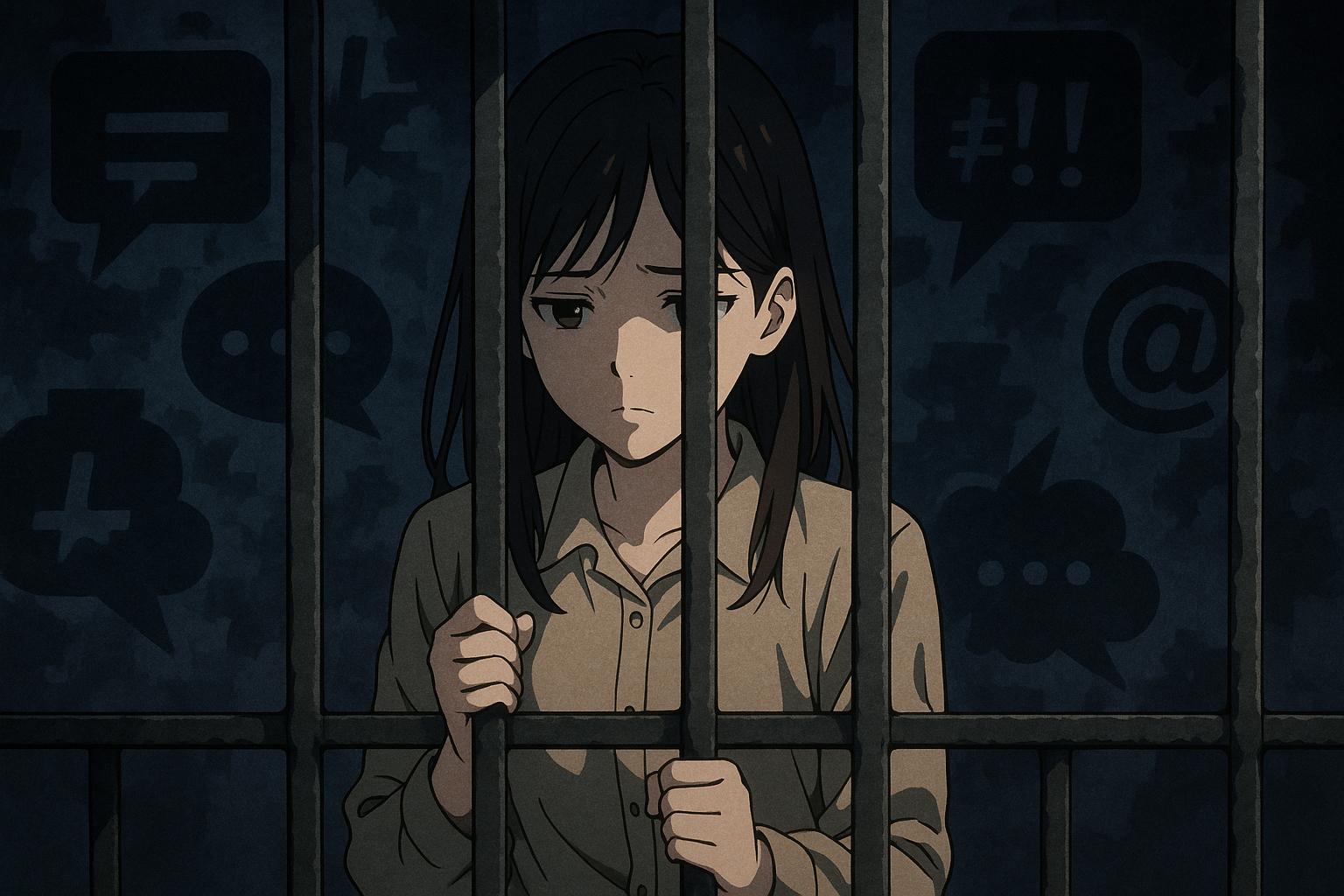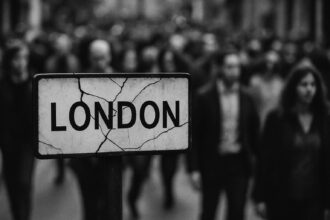The UK faces mounting criticism over its response to online speech and protests following the imprisonment of Lucy Connolly for a social media post linked to deadly riots, while serious offenders benefit from early releases. This disparity raises urgent questions about free expression, public safety, and the balance of justice in a democratic society.
The increasing tension surrounding free speech in the UK has reached a perilous juncture, prompting widespread concern amongst the citizenry. With reports indicating that more arrests for online comments are made daily than in Russia, the question arises: has Britain quietly begun its descent into a form of authoritarianism? Recent events highlight a troubling juxtaposition of legal outcomes within the British judicial system, raising alarms over the state’s handling of discourse and dissent.
The case of Lucy Connolly exemplifies this unsettling climate. Sentenced to 31 months in prison, Connolly’s conviction stemmed from a social media post made on the same day three girls tragically lost their lives in Southport. Her comments, deemed to incite racial hatred, included calls for ‘mass deportation now’ and a suggestion to burn down hotels housing asylum seekers. Although Connolly expressed remorse and had no previous criminal record, the court maintained that her intent was to provoke serious violence, as the subsequent riots confirmed.
These riots were extensive, with over 700 arrests made and more than 300 individuals charged, exacerbated by misinformation regarding the identity of the suspect involved in the earlier tragic event. Such widespread unrest underlines the power of digital platforms to ignite real-world chaos, raising profound questions about accountability and the consequences of online speech. Authorities have underscored the magnitude of the situation, with investigations anticipated to extend for several months.
Amidst this backdrop, critiques of state overreach loom large. Observers contend that the UK appears to be adopting a more authoritarian posture, especially in light of recent legislative measures designed to curtail protests. The Police, Crime, Sentencing and Courts Bill has given police vast powers, igniting fears that essential democratic freedoms may be jeopardised. Critics argue that while the government seeks to bolster public safety, the efficacy of such a heavy-handed approach remains dubious, balancing the need for civil liberties against the demands of national security.
The irony of Connolly’s situation is stark: even as she languishes in prison for an incendiary tweet that echoed her grief and frustration, a significant number of serious offenders are poised for early release due to overcrowded prisons. This juxtaposition of justice raises serious moral and ethical questions. Should a mother with no criminal history—a woman who made a regretful comment in the heat of emotion—face harsher consequences than violent offenders? Connolly’s situation, supporters argue, showcases a disjointed justice system that misplaces its priorities, especially when her continued incarceration contrasts heavily with the leniency shown to habitual criminals.
At stake is not merely the fate of Lucy Connolly but the broader principle of free expression in a society that historically champions civil liberties. As more British citizens experience state scrutiny for their words, the potential ramifications for freedom of speech within all facets of public discourse become ever more concerning. The movement towards liberalising policies for violent offenders while harshly penalising emotional reactions online may contribute to a climate of fear, dissuading individuals from expressing their thoughts openly due to the threat of legal repercussions.
In light of Labour’s recent proposals to release large numbers of serious offenders, many argue that the system is misaligned. The question remains: how can the nation reconcile its commitment to justice and safety when the scales appear so unevenly balanced? Calls for reform are urgent, advocating for a reassessment of policies that govern online speech and a more equitable approach to justice.
As the UK navigates these treacherous waters, the hope is that lessons will be learned to restore public confidence in the criminal justice system—one that should protect its citizens while allowing for the expression of grief, anger, and dissent in a manner that aligns with democratic values. The road ahead will undoubtedly require careful consideration of what it means to live in a free society, as well as a commitment to upholding the principles that have long been foundational to British identity.
Reference Map:
Source: Noah Wire Services
- https://www.dailymail.co.uk/debate/article-14743525/BORIS-JOHNSON-week-Labour-announced-plans-release-rapists-killers-early-theres-one-prisoner-poses-no-threat-FREE-LUCY-CONOLLY-NOW.html?ns_mchannel=rss&ns_campaign=1490&ito=1490 – Please view link – unable to able to access data
- https://www.bbc.com/news/articles/cp3wkzgpjxvo – Lucy Connolly, wife of a Conservative councillor, was sentenced to 31 months in prison for inciting racial hatred through a social media post. On the day three girls were killed in Southport, Connolly called for ‘mass deportation now’ and suggested setting fire to hotels housing asylum seekers. The court emphasized that her message was intended to incite serious violence, leading to widespread disorder. Connolly had no previous convictions and expressed remorse for her actions. The case highlights the legal consequences of online hate speech in the UK.
- https://www.theguardian.com/uk-news/article/2024/aug/09/uk-riots-arrests-made-and-about-people-charged-say-police – Following riots in England fueled by misinformation about a stabbing in Southport, UK police made over 700 arrests and charged 302 individuals. The unrest was sparked by false claims regarding the suspect’s identity, leading to violence and public disorder. Authorities emphasized the severity of the situation, with investigations expected to continue for months. The riots underscore the challenges posed by online misinformation and its potential to incite real-world violence.
- https://www.standard.co.uk/news/crime/lucy-connolly-twitter-post-x-southport-attacks-uk-riots-councillor-b1179575.html – Lucy Connolly, wife of a Conservative councillor, pleaded guilty to publishing material intended to stir up racial hatred. Her social media post, made on the day three girls were killed in Southport, called for ‘mass deportation now’ and suggested setting fire to hotels housing immigrants. The court proceedings highlighted the serious legal repercussions of inciting racial hatred online, with Connolly facing a substantial jail term for her actions.
- https://www.theguardian.com/commentisfree/2022/jan/03/uk-police-state-democracy-insulate-britain-conservatives-crime-bill – Owen Jones discusses the UK’s increasing authoritarian tendencies, particularly in response to protests like Insulate Britain. He critiques the Conservative government’s Police, Crime, Sentencing and Courts Bill, which grants the police extensive powers to control protests and public order. Jones warns that such measures could erode democratic freedoms and lead the UK towards a police state, emphasizing the need to balance public safety with civil liberties.
- https://www.northantstelegraph.co.uk/news/crime/northampton-childminder-remanded-in-custody-until-at-least-september-after-court-hearing-adjourned-4739191 – Lucy Connolly, a 41-year-old childminder from Northampton, was remanded in custody after being charged with publishing material intended to stir up racial hatred. The charges stemmed from a social media post calling for ‘mass deportation now’ and suggesting setting fire to hotels housing immigrants. The court adjourned the hearing, with a provisional date set for September, highlighting the legal proceedings following the unrest in Southport.
- https://www.lemonde.fr/en/international/article/2024/08/15/severe-legal-crackdown-after-uk-riots_6715835_4.html – In response to racist riots in the UK, Prime Minister Keir Starmer pledged severe legal repercussions. Courts delivered harsh sentences, with most convicted rioters receiving prison terms averaging two years. A total of 275 individuals faced prosecution related to the riots, with legal actions expedited for those pleading guilty. The government intends to further bolster online hate laws, emphasizing a stringent approach to prevent further disorder.













